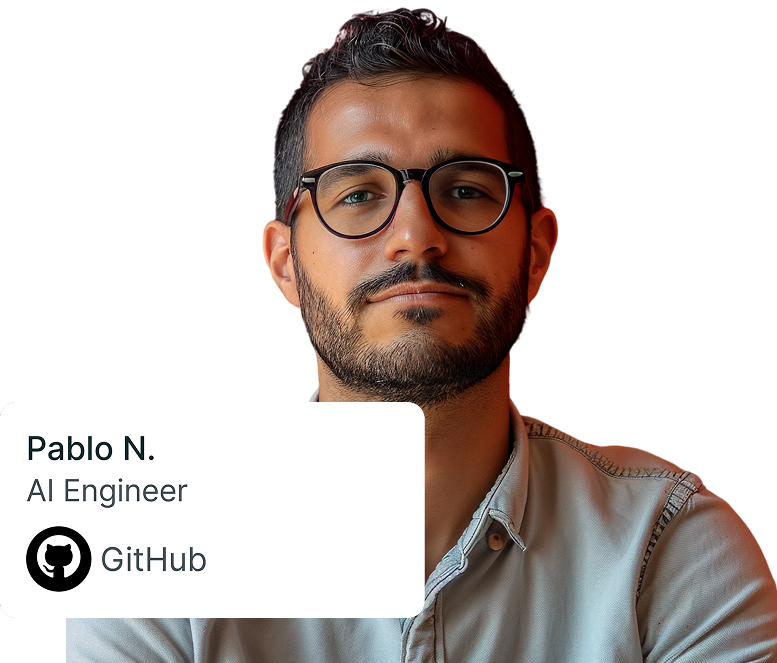There’s no denying that it’s a tough job market for IT professionals. The industry hasn’t bounced back from more than 18 months of tech layoffs. Not only are there more tech job applicants than ever, you are now competing in an AI-backed job market that’s haunted by ghost jobs.
Software developers are under immense pressure to stay technically relevant in the face of an increasingly complex, cloud native, AI-driven technical landscape.
How can you stand out to find your next job in tech? How do you know what skills to learn to advance your career? Cloud and AI skills are a crucial piece of that puzzle, so I talked to Tiago Miyaoka and Renato Sugano, AI and cloud management recruiters (respectively) for the Andela. They shared advice about how you can hop off the application merry-go-round and prepare to land your next technical interview and role in tech.
Popular AI Jobs Need Popular Skills
Andela’s platform includes more than 150,000 tech professionals. This has Miyaoka and Sugano talking to loads of hiring companies and IT professionals every day, giving them deep insights into how best to prepare for a tech evaluation in the current tech job market.
There are an estimated 27 million AI engineer roles open in the next seven years. But, while generative AI (GenAI) dominates headlines and managerial strategy, a lot of what you need to know for these types of roles isn’t new.
“The concepts powering the large language models (LLMs) behind ChatGPT were developed eight years ago,” Miyaoka said. AI generalists are still the most in-demand skills for the data science roles he sees, and those jobs still include a lot of tabular data modeling. Every current or prospective data scientist or machine learning (ML) engineer should have that base down and be able to answer questions about foundational LLM concepts and do live-coding exercises in Python and SQL.
“Companies want to do AI because there is hype, but they still need to use machine learning for their business as usual,” Miyaoka remarked. “Even if your business is using generative AI, you still have the same needs you had one or five years ago in terms of customer churn reduction, for example.”
Even so, AI models are growing exponentially and becoming more specialized. This means it’s important to have a strong foundational base in LLMs, as well as knowledge about the hot topics around generative AI, including retrieval augmented generation (RAG), model fine-tuning and specific fine-tuning techniques. Miyaoka says most data scientists spend about 70% of their time working on these generalist techniques and about 30% on new GenAI work.
Skills You Need to Get an AI Job Interview
A job search process can feel like a job. Along with continually refreshing LinkedIn, you have to be ready — at any time — for job interviews and technical evaluations. How do you decide what to study?
Foundational Machine Learning Concepts
A lot of companies are still testing candidates on the foundational concepts of ML, Andela finds. Be prepared to explain how these models work and ready to do live-coding exercises in Python and SQL. Also be able to answer questions like:
- Explain how you developed something similar to the project at hand.
- Why did you use model X instead of another model?
- How did you measure model X’s efficiency? How did you do it?
Miyaoka asks interviewees about how they would choose the best possible machine learning model and apply it in a given situation. This shows off problem-solving and critical thinking skills and helps uncover whether a candidate has a deeper understanding of machine learning.
Coding Languages
Much of the tech job search process involves technical evaluations, so do whatever you can to boost your coding muscles and keep them strong if you’re not using them daily at work. Contributing to open source projects is one way to do so. They allow you to experiment with and learn to use code in new technologies. Open source communities are also great for networking.
However, while Miyaoka says open source community contributions can sometimes be enough, it usually can’t fully replace on-the-job experience.
“Practical experience matters most; in a job, you have many different challenges and blockers that arise compared with working in open source, in your own environment, on your local computer,” he said. For example, when you work for an enterprise, you have to handle large amounts of data and balance that with budget constraints.
Continuing Education
Since some of this technology is so nascent, taking foundational and advanced AI courses is a great way to beef up your skills. These include:
- DeepLearning.AI with short courses on niche techniques.
- Coursera and EdX, which provide university-based massively open online courses (MOOCs).
Once you have the basics down, Miyaoka recommends learning about more advanced techniques for GenAI models, such as RAG.
Skills You Need to Get a Cloud Job Interview
Cloud experience is also a necessary part of any AI role. While you don’t need experience with any specific cloud provider, Miyaoka said, you should be familiar with one of the Big Three: AWS, Google Cloud Platform or Microsoft Azure. Candidates need to demonstrate that they can set up a new workload in the cloud and then optimize it to run more efficiently.
Even though cloud computing has been in practice for nearly two decades, 71% of Fortune 500 companies are still using mainframes. Sugano often works with companies looking for help migrating from on-premises environments to the cloud. Andela’s talent community augments staffing for these often-complex cloud migration projects that companies are trying to get off the back burner.
For DevOps or cloud engineer roles, most companies are looking for a minimum of five years of experience in cloud migration and infrastructure, two to five years of experience in traditional software engineering, including Java or Python, and knowledge of Infrastructure as Code (IaC) and Kubernetes. If you need to develop new skills in these areas, the Cloud Native Computing Foundation offers a series of cloud native training courses.
“When I’m looking for talent, the two most important parts are their skills and their work experience. Work experience is number one because we can see what they have done,” Sugano said. “Some people have a lot of knowledge because they have certifications and training, but they haven’t had the chance to apply that on daily work and hands-on experience.”
When given a choice, he prefers hands-on experience because “they know what problems can occur and how to fix them,” Sugano said. Bonus if a resume includes experience with scripting languages like Python, Bash, TypeScript and PowerShell. He estimated that 90% of jobs also require Terraform and Kubernetes knowledge.
In fact, he continued, you should include every language you have experience with — and can be tested on — in your LinkedIn profile and resume.
How To Ace a Technical Interview
Experience isn’t the only factor in a successful job hunt. Being able to talk about it is essential, and interviewing is a skill that benefits the most prepared.
“If you put something on your resume, [you must] be able to talk about it,” Miyaoka said. Practice how you’ll discuss each skill, as you may have worked on it a few years ago.
Always be prepared by maintaining a work journal that you update a few times a month. It will help you remember what you’ve done, both for performance reviews and job interviews.
Consider organizing it according to the STAR — situation, task, action and result — method. This is also a good way to organize your resumes and profiles. Use brief, informational statements, like “I built a chatbot using Y LLMs.” Or “I fine-tuned a Llama2 model, and I used LangChain.”
This may start to feel repetitive, but it helps recruiters know your capabilities, Miyaoka said. Be ready to answer related questions, like “Did you do this independently or as part of a team working together?” Sugano said. “I want to understand how deep they went by themselves.”
Andela recruits engineers and data scientists from untapped markets like Africa and Latin America and evaluates technical talent for excellent English communication skills. This capability is important in an industry where the work and code are dominated by that language. “They need to be able to go into a client interview and have a fluent conversation and be able to explain their previous experiences,” Miyaoka said.
“We have cases where the talent may speak well, but in an interview, they get nervous or they don’t understand the questions. They talk about something else or don’t go deep into the technical concept, even though they know the concepts.” This is another place where practicing in advance is so important.
To understand more on how DevOps skills are evolving, download the free whitepaper on How DevOps Skills are Evolving to Deploy Kubernetes in the Cloud.




.png)




.avif)



.png)









.jpg)
